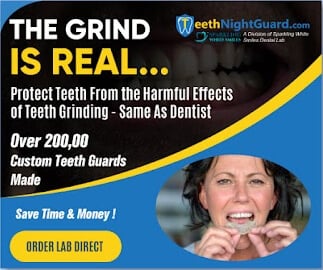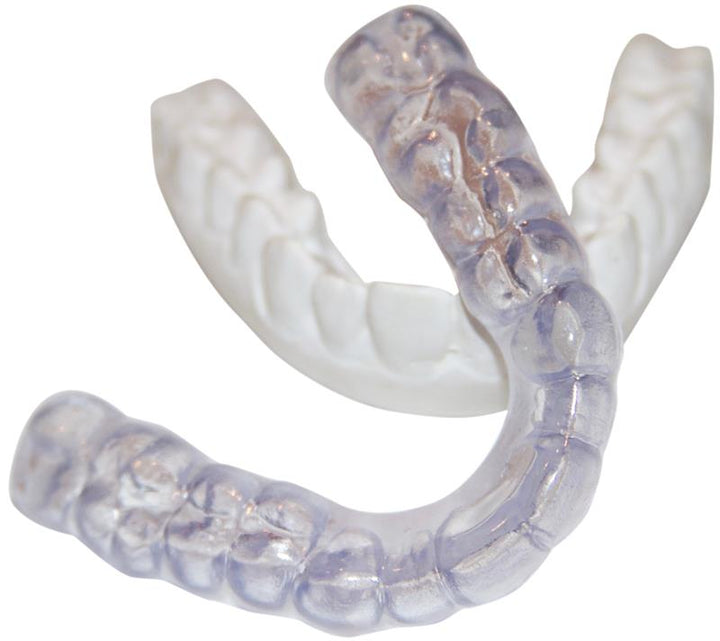It’s known that stress is a major contributing factor to teeth grinding, but did you know that researchers are also investigating a link between teeth grinding and breathing during sleep?
In fact, one of the current theories holds that some teeth grinding arises because of airway closure during sleep. The body responds to the need for more air by grinding or clenching the teeth in ways that help to stimulate and open the windpipe.
What causes breathing to become an issue at night?
Most people have heard of sleep apnea or obstructive sleep apnea. It is characterized by a collapse of the soft tissue around the throat and airway that interferes with breathing and often produces noticeable snoring as well as disturbed sleep. The collapse leads to apneas, or pauses, in breathing during the night.
A more minor occurrence of throat and airway collapse is also possible. In this case, the collapse does not fully pause breathing, but it significantly reduces the size of the airway, causing greater stress on the body during sleep and resulting in brief disturbances that interfere with sleep cycles. This is called upper airway resistance syndrome (UARS). It can lead to daytime drowsiness, difficulty concentrating, digestive issues, and other problems associated with fatigue.
How do these problems relate to teeth grinding and clenching?
And as it turns out, clenching and grinding the teeth may be one of the body’s ways of reinvigorating the muscles of the throat in order to improve breathing during sleep. This could explain why teeth grinding can increase during periods of nasal congestion, such as when you have a cold or allergies. The nasal inflammation can create UARS, and your body can try to counteract the decrease in breathing by grinding or clenching.
Congestion, allergies, and other issues, such as a deviated septum, can contribute to a habit of mouth breathing during sleep. Mouth breathing is not as efficient for oxygen absorption in the body because it does not produce nitric acid as nose breathing does. Additionally, having the jaw open can increase the closure of the airway, impairing breathing even further.
In other words, mouth breathing makes breathing more difficult and less effective. And, when breathing becomes more difficult, your body may respond by grinding or clenching in order to stimulate the muscles of the throat so that they are more engaged.
What can you do?
If you have sleep apnea, you should talk to a medical professional about treatment options that address this issue. A doctor may recommend wearing a style of night guard designed to improve jaw placement. Or you might get a prescription for a CPAP machine. Sleep apnea can cause many long-term effects on your overall health, so it is important to start treating it as soon as possible.
Fewer sleep centers and professionals are accustomed to diagnosing UARS, but you can find sleep clinics that will provide you with excellent options for addressing this condition as well. Sometimes, people with UARS find sleep apnea treatments helpful.
If you have any identifiable problems that inhibit your ability to breathe through your nose, you should also address these. Correcting a deviated septum and finding effective allergy management can quickly improve your body’s ability to breathe efficiently and thereby reduce the frequency and severity of teeth grinding and clenching.
You can also help yourself by avoiding alcohol because alcohol can contribute to teeth grinding as it increases muscle weakness and a loss of the airway tension that’s necessary for easy breathing during sleep.
If you sleep on your back and you find you breathe through your mouth regularly, you might be able to help yourself out by sleeping on your side instead. Gravity can more easily pull your jaw back into your windpipe when you are sleeping on your back.
The way you hold your jaw and tongue during your waking hours can also improve your mouth’s posture during sleep. It is best, when your mouth is at rest, to have your tongue resting against the top of your mouth, your lips closed, and your teeth slightly parted. Focus on staying in this resting posture during the day and you can help to make it your new subconscious “normal” even during sleep.
The benefits go beyond reducing teeth grinding.
Improving breathing will also address the accompanying disruptions to your sleep cycle and the toll those disruptions take on your waking hours. Ongoing breathing issues and teeth grinding can deprive you of time spent in later sleep cycles where your body gets the deepest rest and goes through REM sleep.
Without those crucial phases of sleep on a regular basis, you may find yourself suffering from an impaired immune system, a temperamental digestive system, a shorter emotional fuse, increased stress and generalized anxiety, and even insomnia (because your body has come to associate sleeping with periods of physical stress).
If you are experiencing any of these issues problems, you should see improvement as you address the underlying problems behind your sleep deprivation. But sometimes you will need to work from both sides of the equation, taking steps to reduce stress in your waking life and increase relaxation before bedtime.
To protect your teeth and gums from the effects of grinding and clenching, choose a custom night guard at TeethNightGuard.

JOIN OUR NEWSLETTER! RECEIVE PROMOTIONS & COUPONS FOR CUSTOM DENTAL NIGHT GUARDS
INTERESTED IN BECOMING AN AFFILIATE OF TeethNightGuard.com?
Earn a 15% commission for simply sharing with your friends and family through email or social media such as Facebook, Reddit, or Twitter. Sign up and learn more here: https://www.teethnightguard.com/pages/register-affiliate-account
EXTRA DURABLE 3MM CUSTOM NIGHT GUARD - MAXIMUM DURABILITY AND COMFORT - MOST RECOMMENDED

$119.99
Item Number SWSPRO Manufacturer Sparkling White Smiles Dental Lab Rating Product Description Love this product? Share the product page link with Friends and Family. Simply copy the product page web address or this link: Custom Teeth Night Guard and post!… Read More